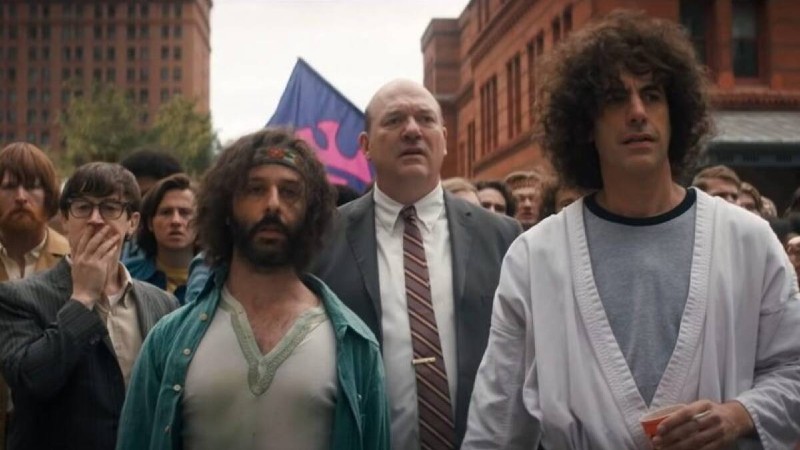




This courtroom drama is extensively set during the trial of Abbie Hoffman (Sacha Baron Cohen), Jerry Rubin (Jeremy Strong), Tom Hayden (Eddie Redmayne), Rennie Davis (Alex Sharp), David Dellinger (John Carroll Lynch), Lee Weiner (Noah Robbins), John Froines (Daniel Flaherty), and Bobby Seale (Yahya Abdul-Mateen II). They were charged conspiracy to start a riot and crossing state lines, during the 1968 Democratic National Convention in Chicago. The defendants add up to eight, but due to Bobby Seale getting a mistrial early on and the fact that he was not actively involved with any of the planning for the protests (he was a last–minute replacement for another Black Panther), the group were often called the Chicago 7. Notoriously conservative Judge Julius Hoffman (Frank Langella) presided over the trial.
Sorkin revived the project (it was originally written for Steven Spielberg) in the wake of Donald Trump’s presidency. Sorkin makes very obvious parallels to the Trump’s administrations attacks on protest and free speech. Sorkin uses considerable dramatic license. The most extreme behaviour – especially from Abbie Hoffman and Jerry Rubin – is often toned down. The film features Sorkin’s trademark overwrought grandstanding dialogue, which is too often skewed to his centrist worldview. For instance, Hoffman literally says: “I think the institutions of our democracy are wonderful things, that right now are populated by some terrible people”- something Hoffman never said in the trial, and also not something Hoffman would have ever said, unless he was ironically mocking liberal democracy.

The cast is excellent. Redmayne as Tom Hayden is a revelation, delivering a powerhouse performance. Sorkin clearly identifies with Hayden the most, even if he paints him as more of a centrist than he actually was (Hayden leaned towards social democracy). The depiction of David Dellinger is the most inaccurate. He was arguably the most radical of the 7: a staunch anarcho-pacifist. The one who walked the walk, not just talked the talk. The film, however, depicts him as a suburban dad. He did live in the ‘burbs, but in an anarchist commune. The moment that truly tramples on his honourable legacy is when he sucker punches a bailiff, something Dellinger would’ve never done. It seems like the only purpose of this scene was make a lame joke about pacifists. Dellinger also had the big speech at the end of the trial, not Hayden, and he read out the names of both American and Vietnamese soldiers who had been killed in the war. In the film, Hayden only reads out American names…
Overall, this is a prime piece of Oscar bait, elevated by the performances and the subject matter. Sorkin can write, even though he should’ve stuck to the hilarious transcript of the real trial instead of his centrist fantasies. It ends up being a film about people who wanted to reform the system, but the reality is these men wanted to burn it to the ground and start anew. The film would’ve swept the Oscars in 1996. It seems unlikely that it will today.
The Trial of the Chicago 7 received five Oscar nods, including Best Picture. You can watch it now on Netflix.
















